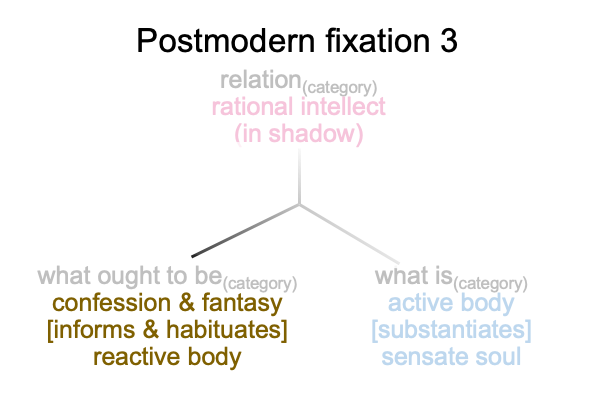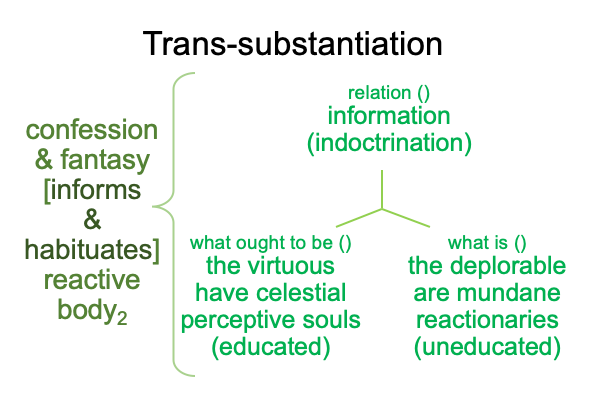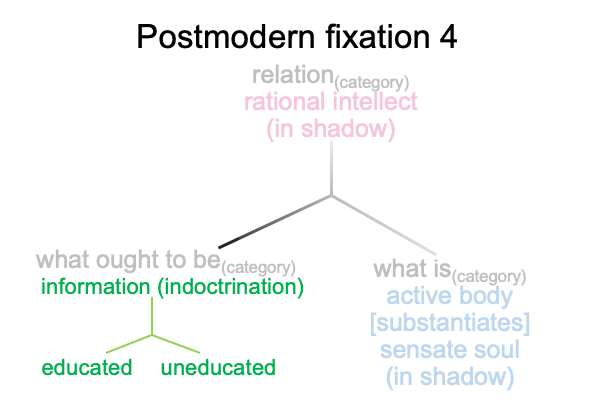0221 Funny, desire is the only thing that postmodernists want to talk about. Why? Forcing others to confess their desiresconstitutes a form of bureaucratic control. Libido Dominandi. To talk about desire is to conjure phantasms2b without sensations2a, or maybe, in search of sensations2a. The reactive body1b becomes habituated to act out certain sensations and feelings2a, making the fantasy what it ought to be2c.
0222 How do post-modern academics fixate on desire?

0223 Well, what ought to be looks vaguely pornographic.
What better way than to stimulate the limbic system, than with a promise of sexual liberation…
…and political control.
Ah, what year does America’s supreme court redefine pornography as “free speech”?
Here is a ruling that no one wants to talk about.
0224 Postmodernism defines what ought to be.
Academic discussions center on confession and fantasy. Confession is demanded even of the befuddled. Fantasy is also required. If I cannot fantasize my victimhood, then I must be a perpetrator. Ask Clarence Thomas. Ask Brett Kavanaugh. Confession of one’s victimhood is prized. The rational intellect is openly disregarded as a co-conspirator in thought-crimes or as a self-imposed denial of the pain. Sensations and feelings are salient when they enhance the fantasy of victimhood.
The academic wants to know. What is your desire? What are you guilty of? What do you accuse others of?
Cupid’s arrows carry twisted barbs. Ask Jacques Lacan. Ask Michel Foucault.
0225 Augustine comes up with ‘something’ quite similar. He calls it “concupiscence”. The term translates literally into “the state of being with Cupid”. Cupid is the passion child of Venus, the goddess of love, and Mars, the god of war. What better companion to have in party town? Cupid’s quiver is full of arrows of desire.
Augustine claims that original sin passes from Adam to us (today) through the act of conception. Conception entails “free speech”, if you know what I mean. Procreation is entangled with concupiscence. The two (or is it three, considering the natural consequence?) cannot be separated.
Augustine provides a mechanism for how Adam’s rebellion places the infant in the condition of original sin.
0226 The infant is subject to the actuality portrayed in the above figure, postmodern fixation 3. Yes, the infant must confess that his parent’s fantasies inform their reactive bodies, habituating them, so that their actions are never innocent. The lack of innocence transmits from parent to babe. The infant bears the guilt of “his” own conception.
0227 Am I surprised that the site of naming in postmodern fixation 3 coincides with Augustine’s concupiscence?
Perhaps, not. After all, what ought to be associates to desire. Power demands that desire reveal itself. Only through confession and fantasy can desire be managed by experts. Postmodern academics are not “judgmental”. They are managerial.
0228 Postmodernism takes the dyadic actuality, confession & fantasy [informs and habituates] reactive body2, in directions that Augustine never anticipated. The educated can name their desires. The uneducated brutes cannot.
How do the educated know the spoken words appropriate to this or that combination of perceptive soul [informing and habituating] reactive body?
0229 They have the information. They have created a cognitive framework from their fevered imaginations.
The postmodern academic constructs terms that apply to the contiguity between perceptive soul and reactive body. Only the educated can label their phantasms, thereby honoring themselves as star-filled perceptive souls, elevated above the mundane reactionaries who remain reticent to name their desires. The reactionaries are full of fear. They are deplorable. They ought to be ground into dust.
0230 Disorientation transubstantiates into utopia.
Utopia represents the trans-substantiation of a dyadic element in judgment into a full-fledged triadic structure. Here, what ought to be moves from realness (secondness) to judging reality (thirdness).
Yet, it remains in place as an element of a larger judgment.
What ought to be becomes a sick imitation of original justice2c.

0231 Three hundred years after Saint Paul writes a letter to the Romans, Augustine formulates his mechanism for original sin.
A thousand years after Saint Augustine writes of original sin, Thomas Aquinas formulates the concept of original justice, as the good that original sin fails to deliver.
Eight hundred years after Saint Thomas writes of original justice, these comments propose that Augustine’s concept of concupiscence is the substrate for a bureaucratic formulation that socially constructs a utopia, a judgment that malignantly parodies original justice2c, coinciding with the ministrations of a modern religion, Big Government (il)Liberalism.
Houck never gives us a clue as to how horrifying our substitutes for original justice2c can be.
Or, how relevant.
It is as if original sin cuts original justice down to whatever it can name with speech-alone words, then sears this reduction with a flame of madness.
0232 If the what ought to be of original justice is named, “desire”, then those who construct the name and those who are indoctrinated into the expressions of the name stand against those who do not. This judgment evokes an ideal, a utopia, where the believer apparently achieves what is lost in Adam’s rebellion, the wholeness of commitment2c, the fruit of the tree of life.
Within this utopia, there is a stain that must be rooted out.
The uneducated must be purged.
So-called “liberalism” becomes illiberal.
But, no one can say that, without banishment.
So, the (il) is silent.
0233 Here is a picture of a Big Government (il)Liberal postmodern academic utopia, within its larger setting.

Don’t be taken aback. This is only theoretical. There is no real-world academic who idealizes to such an extent that what ought to be trans-substantiates into a judgment that then takes the place of commitment2c.
Is there?
0234 In the Story of the Fall, small details loom large.
After God drives the man and the woman from the Garden of Eden, He places a cherubim, and a flaming sword that turns every direction, to guard the way back to the tree of life (Genesis 3:22).
In the utopia of postmodernism, the virtuous have celestial perceptive souls. They apply their swords of spoken names. Their swords turn in all directions. They have a label for every opponent. If the uneducated person is not this, then the uneducated person must be that.
The utopians savor their fixation on what ought to be2c. In order to complete their vision, death must prevail over the mundane reactionaries, just like death prevailed over the shamans who wanted to retain the old, timeless traditions of the Lebenswelt that we evolved in.
Cherubim holding flaming, swerving swords stand in the mirror of the world3a.
When we see their reflections1a, we see ourselves.
0235 I guess, I got this section turned around.
I should be asking, “What does original justice tell me about the consequences of the first singularity?“
